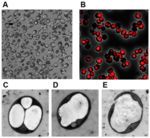-
Sustainable binder alternative - 18/12/2023
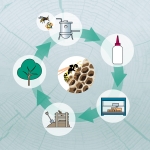
Plastic is all around us; and unfortunately, it is not going away any time soon. The search for more sustainable solutions is fully underway. However, binders that degrade only with difficulty or not at all are still used to bond natural materials such as wood and straw - not yet truly environmentally friendly. Fraunhofer researchers are working on an insect-inspired wood binder that makes bonded wood products both resistant and biodegradable.
https://www.biooekonomie-bw.de/en/articles/news/copied-insects-new-biological-wood-binder-under-development
-
Wasser 3.0: #detect|remove|reuse - 31/10/2023
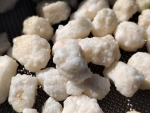
We all pollute our water with things we use in our everyday lives. In the process, microplastics and micropollutants accumulate in sometimes significant quantities and are difficult to remove. This has increasingly devastating consequences for our health and the environment. Wasser 3.0, a non-profit start-up from Karlsruhe, has declared war on this problem by developing a customisable process to detect, remove and even recycle these pollutants.
https://www.biooekonomie-bw.de/en/articles/news/how-sustainably-remove-and-recycle-microplastics-water
-
Microorganisms degrade biobased turf infill - 17/10/2023
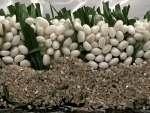
There are thousands of artificial turf pitches in Germany. They are extremely practical, but often not at all environmentally friendly. When it rains or the pitch is used, plastic particles from the rubber granules can be released into the envronment, where they remain. Researchers at the University of Stuttgart along with the company TECNARO are now developing an artificial turf with an infill that biodegrades as soon as it leaves the pitch.
https://www.biooekonomie-bw.de/en/articles/news/eco-friendly-artificial-turf-sports-pitch-s-good-people-and-environment
-
Preventing waste from instant meals - 05/10/2023
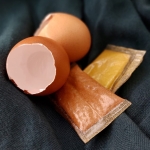
Many instant meals such as ramen soups have both a protective outer packaging and individual ingredients in small plastic sachets. To prevent this environmentally harmful waste, five students at the University of Hohenheim have developed a sustainable film based on eggshells and plant proteins that dissolves in hot water and is edible.
https://www.biooekonomie-bw.de/en/articles/news/edggy-edible-packaging-film-made-eggshell-waste
-
-
-
3D-Thermocell project - 17/05/2023

Replacing plastic – for example in packaging – is not that easy but nevertheless urgently needed. In the 3D-Thermocell project, researchers at DHBW Karlsruhe are currently developing new plastic substitute products made of thermoformable paper as a renewable resource, which should be cheap and light and easy to dispose of along with waste paper. The characterisation and application of demonstration models will start soon.
https://www.biooekonomie-bw.de/en/articles/paper-instead-plastic-sustainable-packaging-good-conscience
-
Press release - 16/05/2023
This year's Venice Architecture Biennale sees itself as a "Laboratory of the Future". Bio-composites are not just dreams of the future in architecture. The German Institutes of Textile and Fiber Research (DITF) have developed a sustainable material for support profiles and connecting nodes, which will be on display at Palazzo Mora during the Biennale from May 20 to November 26.
https://www.biooekonomie-bw.de/en/articles/pm/bioverbundwerkstoff-auf-der-architektur-biennale-venedig
-
-
Press release - 26/04/2023
Ready-made meals are ideal for quickly satisfying hunger. However, the quick snacks produce a lot of environmentally harmful plastic waste. To tackle this problem, the student team EDGGY from the University of Hohenheim in Stuttgart rolled up its sleeves and developed edible packaging made from eggshells and other plant-based raw materials. And even better: they simply dissolve in the hot water and can be eaten as an additional protein boost.
https://www.biooekonomie-bw.de/en/articles/pm/Simply-EGG-genious-Students-invent-edible-packaging-from-eggshells
-
Press release - 25/04/2023
Roboticists at the Max Planck Institute for Intelligent Systems in Stuttgart have developed a jellyfish-inspired underwater robot with which they hope one day to collect waste from the bottom of the ocean. The almost noise-free prototype can trap objects underneath its body without physical contact, thereby enabling safe interactions in delicate environments such as coral reefs. Jellyfish-Bot could become a tool for environmental remediation.
https://www.biooekonomie-bw.de/en/articles/pm/jellyfish-robots-could-one-day-clean-worlds-oceans
-
Press release - 21/04/2023
In collaboration with the project partners CG TEC, Cordenka, ElringKlinger, Fiber Engineering and Technikum Laubholz, the DITF are developing a new fiber composite material (CELLUN) with reinforcing fibers made of cellulose. The matrix of the material is a thermoplastic cellulose derivative. CELLUN made from renewable biopolymers enables the replacement of glass or carbon fibers in the production of industrial molded parts.
https://www.biooekonomie-bw.de/en/articles/pm/cellun-fiber-composite-made-biopolymers
-
-
-
-
-
-
-
Festo’s high-tech bioreactor - 10/11/2022
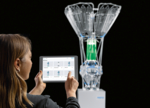
In future, algae could be used to produce practically everything that still requires petroleum, including plastics, fuels, medicines and food. Algae are also climate savers par excellence, because they bind ten times more CO2 than terrestrial plants. Festo, a company based in Esslingen, Germany, has developed a high-tech bioreactor that can be used to automatically cultivate the small green biofactories - and that do so a hundred times more…
https://www.biooekonomie-bw.de/en/articles/news/valuable-materials-all-kinds-produced-automatically-living-cells
-
Press release - 02/11/2022
Whether in drinking water, food or even in the air: plastic is a global problem - and the full extent of this pollution may go beyond of what we know yet. Researchers at the Karlsruhe Institute of Technology (KIT), together with partners from the Netherlands and Australia, have reviewed conventional assumptions for the transport of plastic in rivers.
https://www.biooekonomie-bw.de/en/articles/pm/blind-spots-monitoring-plastic-waste
-
-
Project BW2Pro - 29/08/2022
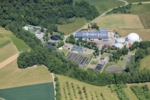
In 2020, Germany’s population collected over 5 million tonnes of biowaste. Most of this was composted, and some was fermented into biogas. Scientists in Baden-Württemberg think there's room for more. Within the project ‘Biowaste to Products’ (BW2Pro) they want to transform biowaste into new products in a biorefinery. The idea is to produce biodegradable plant pots, mulch material, fertilisers, enzymes and biobased plastics in addition to…
https://www.biooekonomie-bw.de/en/articles/news/biowaste-products-biorefinery-transforms-biowaste-new-products
-
-
-
Press release - 02/03/2022
The Ministry of the Environment, Climate Protection and the Energy Sector is funding the KoalAplan project, which extends the functional scope of a wastewater treatment plant. The project, based in the Stuttgart district of Büsnau, aims at recovering raw materials from wastewater and is therefore making a positive contribution to climate neutrality, as the products obtained replace fossil raw materials and energy-intensive processes.
https://www.biooekonomie-bw.de/en/articles/pm/biorefinery-project-koalaplan-extracting-raw-materials-wastewater
Website address: https://www.biooekonomie-bw.de/en/search







